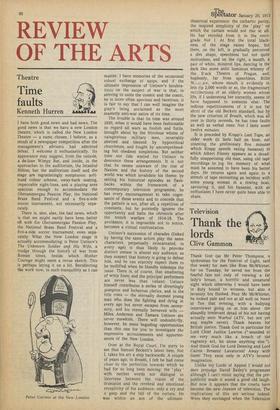REVIEW OF THE ARTS
Theatre
Time faults
Kenneth Hurren
I have both good news and bad news. The good news is that we have a new London theatre, which is called the New London Theatre — a name chosen, I believe, as a result of a newspaper competition after the management's advisers had admitted defeat. I welcome it enthusiastically. Its appearance may suggest, from the outside, a de-luxe Wimpy Bar, and inside, in the approaches to the auditorium, the Istanbul Hilton; but the auditorium itself and the stage are ingratiatingly sumptuous: softhued colour scheme, sway-back seating, impeccable sight-lines, and a playing area spacious enough to accommodate the Oberammergau Passion Play, the National Brass Band Festival and a five-a-side soccer tournament, not necessarily separately.
There is, also, alas, the bad news, which is that we might easily have been better off with tine Oberammergau Passion Play, the National Brass Band Festival and a five-a-side soccer tournament, even separately. What the New London stage is actually accommodating is Peter Ustinov's The Unknown Soldier and His Wife, a trudge through the history of war from Roman times, beside which Mother Courage might seem a revue sketch. This is perhaps laying it on a bit. Recollecting the work now, in such tranquillity as I can muster, I have memories of the occasional robust exchange of quips, and if the ultimate impression of Ustinov's lucubration3 on the subject of war is that, in striving to unite the cosmic and the comic, he is more often specious and facetious, it is fair to say that I can well imagine the play's being acclaimed as the most masterly anti-war satire of its time.
The trouble is that its time was around 1930, when it would have been fashionable to regard all wars as foolish and futile, brought about by the frivolous whims of vainglorious military men, invariably abetted and blessed by hypocritical churchmen, and fought by uncomprehending but obedient simpletons. But neither time nor tide waited for Ustinov to denounce these arrangements. It is not that he seems unaware of the rise of Nazism and the history of the second world war which invalidate his theme: by setting his historical episodes as flashbacks within the framework of a contemporary television programme, he has every encouragement to take cognisance of these events and to concede that the pattern is not, after all, a repetition of constants, but he pointedly ignores the opportunity and halts the chronicle after the trench warfare of 1914-18. The avoidance, it is impossible not to notice, becomes a virtual confrontation.
Ustinov's succession of charades (linked by having the same actors play the same characters, perpetually reincarnated, in every age) is thus likely to provoke distinct unease in almost any audience, as they suspect that history is going to defeat him, and he can scarcely expect them to be mollified when he blandly sidesteps the issue. There is, of course, that smattering of witty lines; and the principal performers are never less than valiant: Ustinov himself contributes a series of divertingly pompous and lecherous clerics, and in the title roles — the eternally doomed young man w'no does the fighting and dying in every age but never escapes from anonymity, and his eternally bereaved wife — Miles Anderson and Tamara Ustinov are never mawkish. There will undoubtt.11y, however, be more beguiling opportunities than this one for you to investigate the impressive accoutrements and appurtenances of the New London.
Over at the Royal Court, I'm sorry to see that Samuel Beckett's latest item, Not I, takes his art a step backwards. A couple of years ago, in Breath, I felt he had come close to the perfection towards which he had for so long been moving: the ' play ' with neither words nor dialogue to intervene between the vision of the dramatist and the cerebral and emotional receptivity of his audience; only a cry and a gasp and the fall of the curtain. He was within an ace of the ultimate theatrical experience: the cathartic purity, the inspired simplicity of the ' play ' on which the curtain would not rise at all. He has recoiled from it in the retrograde Not I. At first the total blackness of the stage raises hopes, but there, on the left, is gradually perceived a dim shape, speechless but not quite motionless; and on the right, a mouth, a pair of white, minstrel lips, dancing in the dark like some antic luminous whimsy of the Back Theatre of Prague, and, haplessly, far from speechless. Billie W.,. ic.aw, whose mouth it evidently is, lets rip 2,000 words or so, the fragmentary recollections of an elderly woman whose life, if I understood her correctly, seems to have happened to someone else. The tedious repetitiousness of it is not far short of the old Beckett standard, but by the new criterion of Breath, which was all over in thirty seconds, he has time faults as well as verbal ones: Not I lasts some twelve minutes.
It is preceded by Krapp's Last Tape, an older work (it lasts half an hour, not counting the preliminary five minutes which Krapp spends eating bananas) in which Albert Finney appears as a dreadfully unappetising old man, using old tape recordings to jog his memory of what must be assumed to have been his better days. He returns again and again to a stretc'n of tape recounting an incident with some young woman in a rowing boat, savouring it, and his bananas, with an enthusiasm I have never quite been able to share.


































 Previous page
Previous page